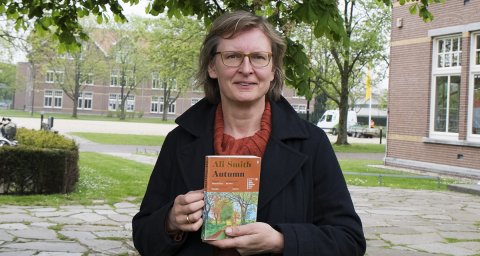Campus reads ‘Autumn’
The One Book One Campus project had its primer at University College Utrecht last year. This year, students and staff read Autumn by Ali Smith. The project culminates in the visit of the author in November.
“One Book One Campus is about being a community and sharing stories,” says Agnes Andeweg, lecturer at University College Utrecht and initiator of the project. She got the idea for One Book One Campus from similar reading projects at American universities. “I think communal reading is a great way to connect people and to make connections between reading fiction and one’s daily life.”

Last September, copies of The Book Club by the Dutch author Maxim Februari were omnipresent on campus. There were book club meetings, and students and staff got the opportunity to discuss the novel with the author himself, a model to which One Book One Campus will stick this year as well.
Making connections
When Agnes met the British author Ali Smith at a book presentation of Autumn last year, she knew immediately that she had found the author and the novel she was looking for. To her delight, Smith agreed to come to Utrecht this year.
“Ali Smith is a great writer to take this project up with, as her novels are topical, funny and poetic at the same time. She has said that novels are a kind of ‘elsewhere’, and that is true, but not in an escapist way; they make new kinds of connections between us and the world possible. This makes the novel relevant to a Liberal Arts and Sciences college like ours, where we are constantly looking for linkages with the world outside and encouraging our students to engage with it.”
The One Book One Campus audience will be broader than in the first edition: Agnes has invited other Utrecht University students and lecturers to join in. The student association of the Philosophy, Politics and Economics programme will organise a meeting, lecturers at the Faculty of Humanities will include the book in courses, and the Centre for the Humanities will sponsor a prize for a writing contest.
Reading the world
“In her novels, Smith manages to capture very well how we all try to make sense of the world and cope with all its layers, big political issues and small details alike. Autumn was called the first Brexit novel, because it rendered the post-referendum confusion so well.”
“Reading as a means to make sense of the world is a red thread throughout the novel. In Autumn, a young girl, Elisabeth, befriends an old man and he keeps asking her questions about her future and her reading. In his view, someone who does not read books cannot read the world either.”
And Autumn has yet more to offer: it is about arts, society and politics, but also about cultural identities. Agnes:
“Smith links arts, society and politics, in scenes that are both comical and wry: like when Elisabeth tries to get a new passport and her picture isn’t right. Furthermore, Autumn is about how to talk to strangers and understanding the perspective of others, as well as about the way society excludes voices which do not fit the mainstream. In Autumn, it is a forgotten female pop artist, Pauline Boty, who is completely neglected by art historians until the novel’s young protagonist decides to write her thesis about her.”
“As for the old man’s question about the girl’s future, she refuses to choose between this or that option; she wants them all. So it is not college she wants, he tells her, but collage. I think that applies to our students as well, as they combine many different fields in their curriculum. And Autumn is not a straight-forward novel with a beginning and an end. In a way, it is a collage itself. What could be more fitting?”
The event with Ali Smith will take place in the International Campus Auditorium on 7 November 2019. On 6 November, the author participates in the celebration of the 35th anniversary of bookshop Savannah Bay, also in Utrecht.
Students can purchase their copy of Autumn at a reduced price from the start of the new academic year at the reception of University College Utrecht.

